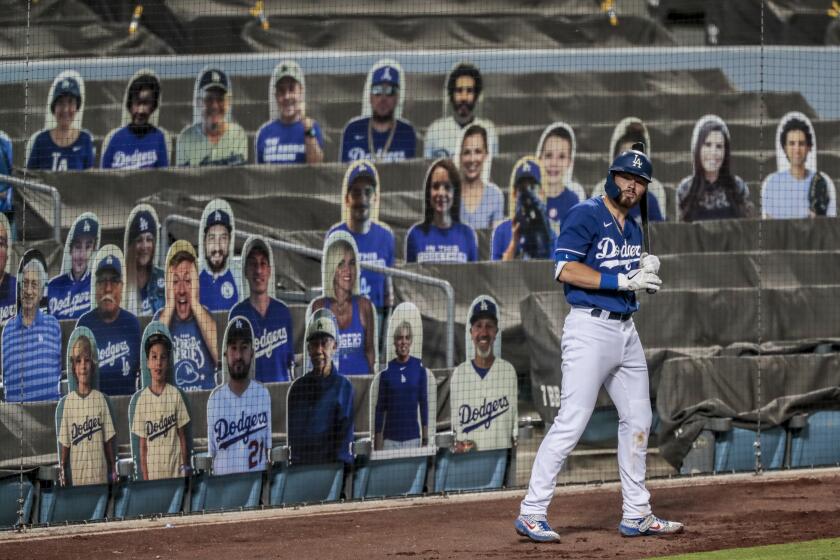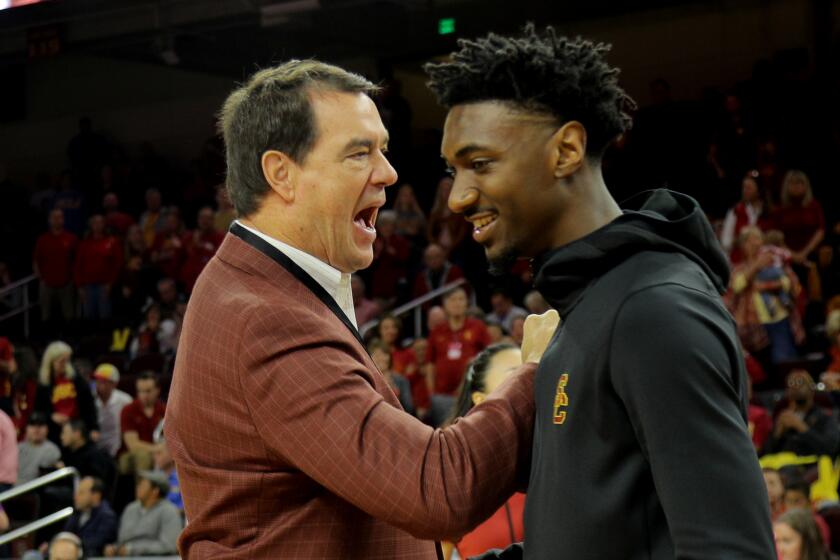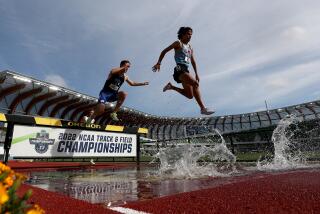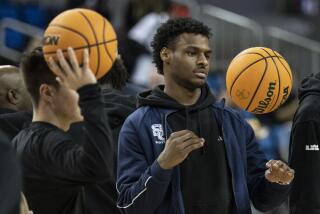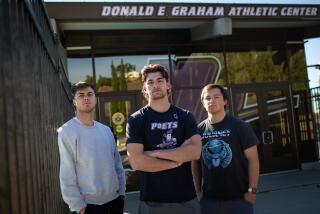At Biola University, track and field athletes must adjust to a season interrupted
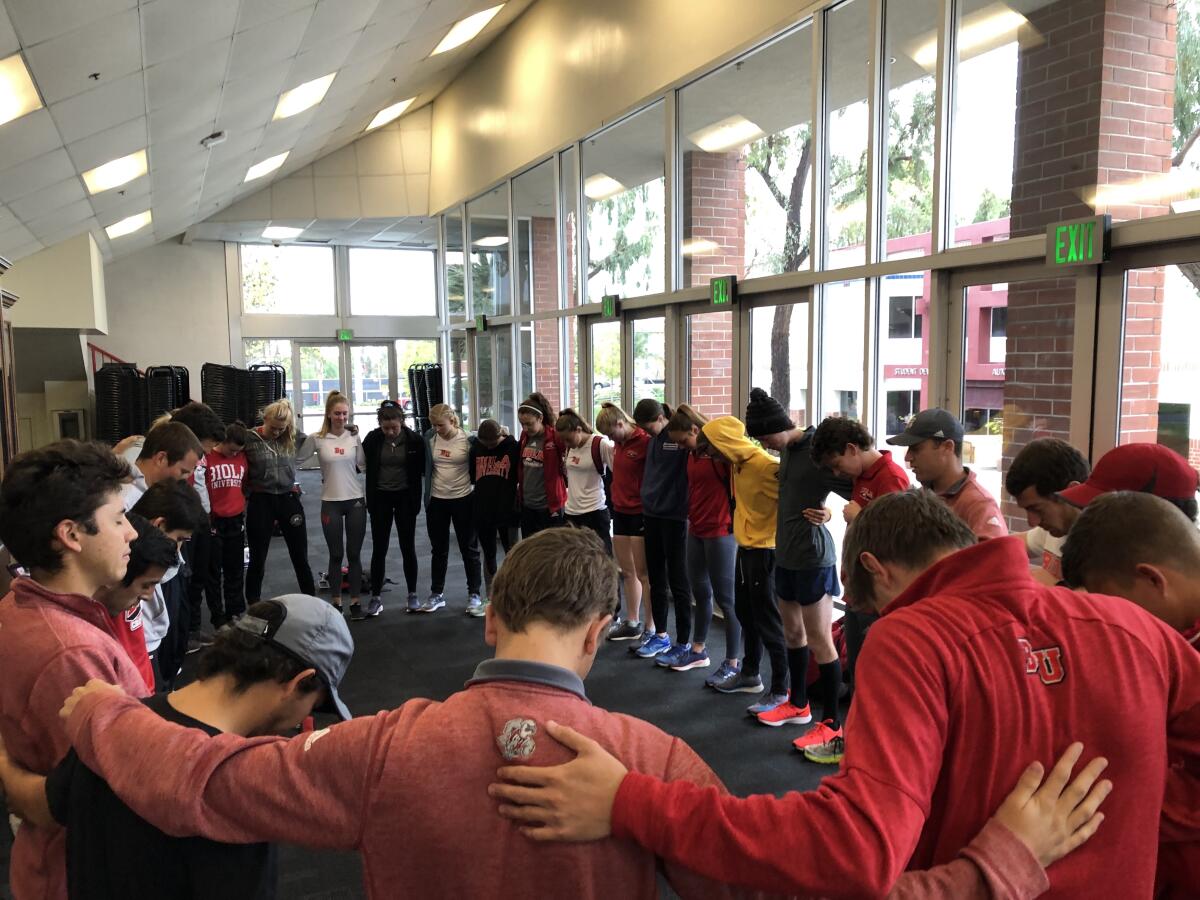
- Share via
Biola University’s track and field team was supposed to spend Saturday competing at Occidental College. But as concerns over the spread of the novel coronavirus grew in recent days, the meet was canceled.
The Eagles’ backup plan, a meet at Cal State Fullerton, was soon canceled as well, and before Sean Henning, the cross-country and track and field coach at the Christian university in La Mirada since 2015, could even send in his entries to yet another meet near San Diego, it too was called off.
Soon, there were no more options. Hours after the NCAA canceled all winter and spring championships Thursday, joining other leagues that banned large-scale gatherings in hopes of slowing the virus’ spread, the PacWest Conference, in which Biola competes at the Division II level, suspended all competitions through March 30.
Instead, Henning began a gloomy, cloudy Saturday morning inside the lobby of the university’s gymnasium, speaking to 28 distance runners wondering whether their season had ended before it ever truly began. He thanked them for how they’d handled the disappointing news. And then he did what university leaders have often done in the 112 years since its founding as the Bible Institute of Los Angeles. He called for a prayer.
Stories examining the impact the spread of the coronavirus has had on the NBA, NHL, MLB, the NCAA tournament and the rest of the sports world.
Runners formed an uneasy oval at first, unsure how close to get. Some teammates touched elbows, others the tips of their sneakers. Eventually, outstretched hands rested on teammates’ shoulders and backs.
“You give us two legs, lungs, a heart,” Henning said, his head bowed, “and we’re thankful that no matter what, we can still come out and run, whether it’s a race with a bunch of other teams, or just us.”
They soon headed to their own track, where it was just the Eagles racing in time trials of 800 meters and the mile. It was one of an untold number of disruptions to the sports landscape in the wake of the global coronavirus pandemic that has turned the sports world dark, a sting that has been felt particularly deeply on this verdant campus of nearly 6,000 students near the border of Los Angeles and Orange counties.
For the last two years, amid Biola’s transition from membership in the NAIA to Division II of the NCAA, its athletes had been ineligible to compete in NCAA postseason championships. That changed last fall, when Biola became a full-fledged Division II member. All-American runner Gabe Plendcio thought his senior season might end in late May, at the outdoor track and field championships in Kingsville, Texas, where he could finally race on the track against the best in Division II.
Instead, he considered that his career might have ended Saturday. He barreled down the backstretch of Biola’s track in his red-and-black uniform to cheers from teammates and sounds of traffic on nearby La Mirada Boulevard, winning an intrasquad time-trial mile in 4 minutes 16 seconds. He is one of several upperclassmen who had waited patiently for the ending they had envisioned, only to have it abruptly interrupted.
“I still feel like trying to pinch myself and wake up from this dream,” he said. “I was excited to finish up my track season. I was looking forward to graduating. But not in this way. It doesn’t seem like there’s any real closure from anything.”
Jessica Cody, a graduate student and distance runner also in her final year of eligibility, has battled injuries for five years. This spring, months after recovering from a serious ankle injury, she felt healthy enough to make a serious postseason bid.
Athletic director Mike Bohn’s steady hand and guiding principle, according to administrators and coaches, helped USC through trying times this week.
Now, “I definitely do feel like it’s been taken away,” Cody said. “It’s been hard to process. Wednesday we thought, we’re racing. The next day it’s like, this meet’s canceled, this meet’s canceled, this meet’s canceled.
“It doesn’t really feel real yet. It hasn’t totally sunk in.”
The NCAA on Friday took the extraordinary step of announcing it would grant an extra season of eligibility to athletes whose seasons have been cut short by precautionary measures to combat the spread of coronavirus. But unlike professional athletes, many college athletes in their final season of eligibility do not have the luxury of waiting out their next season. For Plendcio, Cody and Shannon Howell, a senior specializing in middle distances, choosing another year in college means putting previous plans on hold.
Plendcio has a job waiting at a cancer research institute near San Diego. Howell was considering teaching and coaching next year. The athletes were still weighing their options.
Biola first researched NCAA membership a decade ago and began the four-year process to join in 2015, athletic director Bethany Miller said. While its teams were not eligible for the NCAA postseason, the Eagles competed in National Christian College Athletic Assn. championships. There, Henning’s men’s cross country team won national championships in 2017 and 2018 behind Plendcio’s individual titles. The women’s team claimed a title in 2018 as well.
But testing themselves against Division II competition was “this goal we were reaching toward,” Cody said. Howell said she was in denial when she learned of the suspended season and canceled championships Thursday. She has resolved to stay positive around younger runners who could use this spring to train toward future seasons. But she cried hearing about the cancellations again a day later, in a team meeting, saying the news had set in.
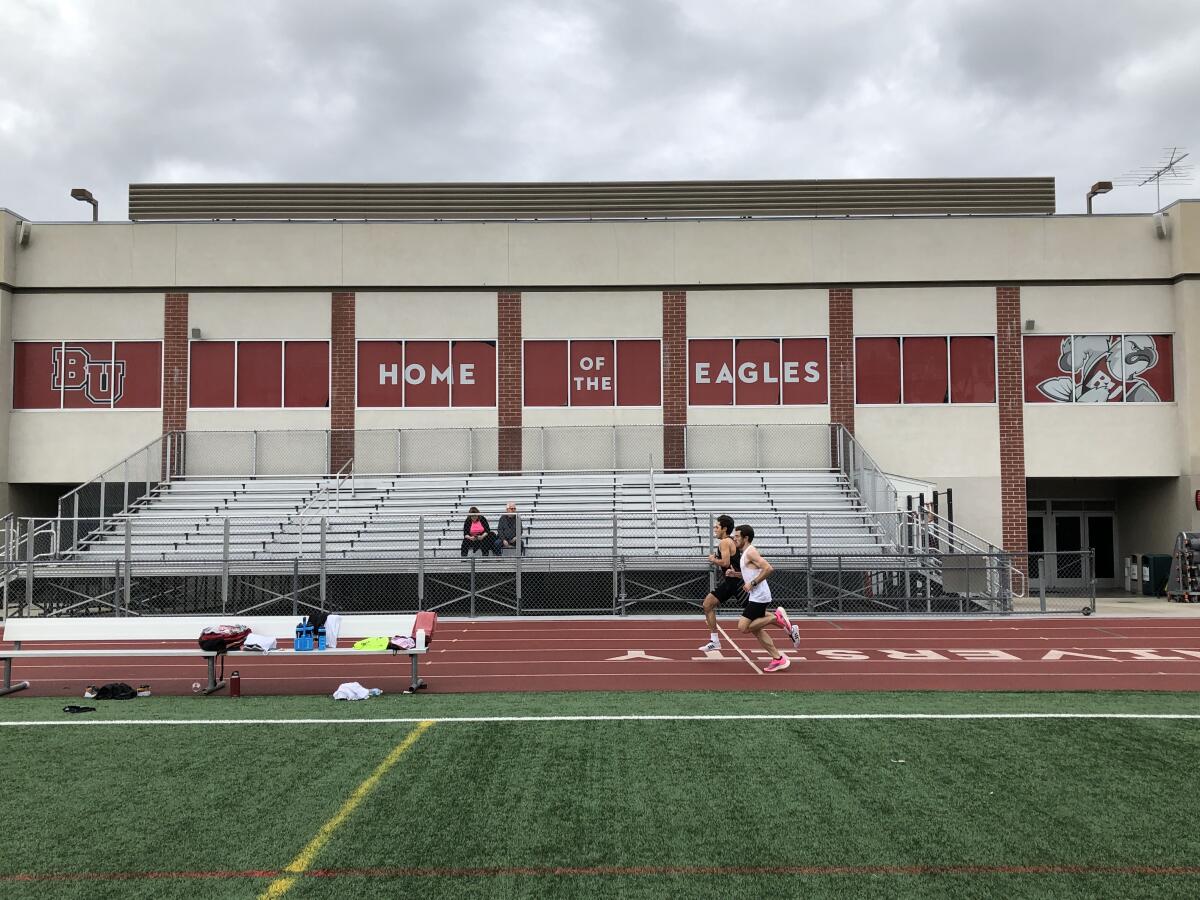
“It’s hard because you have goals in mind,” Howell said. “When those things are taken, you do get to this point where it’s kind of like, what’s the point? The real point is just to be here with the girls.
“I’ve been doing sports since I was 4, so it’s kind of hard. This is my last time ever in sports. It could be.”
Biola’s spring-sport coaches were told they could hold optional practices during the conference hiatus, and Henning promised athletes to provide structure, which “right now is more important than probably any other time, to have something you know that is somewhat concrete in your life.”
Yet Henning understood his roster could be whittled in the coming weeks. Though the university’s cafeteria and residence halls remained open Saturday, all classes are now offered online-only, and athletes have already opted to return home. Plendcio was still deciding whether to join them. He lost a part-time job at an on-campus office recently, making the rent payment at his off-campus housing more difficult, and his aunt and uncle, who is ill, have asked him to return home, north of San Diego.
“I still plan to run after graduation,” Plendcio said, “but it’ll never be something like this, part of a team.”
The choice wracked him. And less than two days later, it was made for him when the university canceled all spring-sport team activity, including practices, Sunday evening following updated recommendations from the Centers for Disease Control and Prevention.
On Saturday, Plendcio hugged Henning before leaving Biola’s red track, telling the coach he would keep in touch. Left unsaid was when they would see each other again.
A few meters away, down the straightaway that ran in front of empty grandstands, women’s distance runners posed for pictures. Their time trials were over and, with them, a career.
“It feels like a goodbye in some ways,” Cody said. “That was their last college race. It does feel significant. It feels special. We’ve been together a long time. It’s hard to think that’s how it ended. If I really thought about it, I could get emotional.”
More to Read
Go beyond the scoreboard
Get the latest on L.A.'s teams in the daily Sports Report newsletter.
You may occasionally receive promotional content from the Los Angeles Times.

